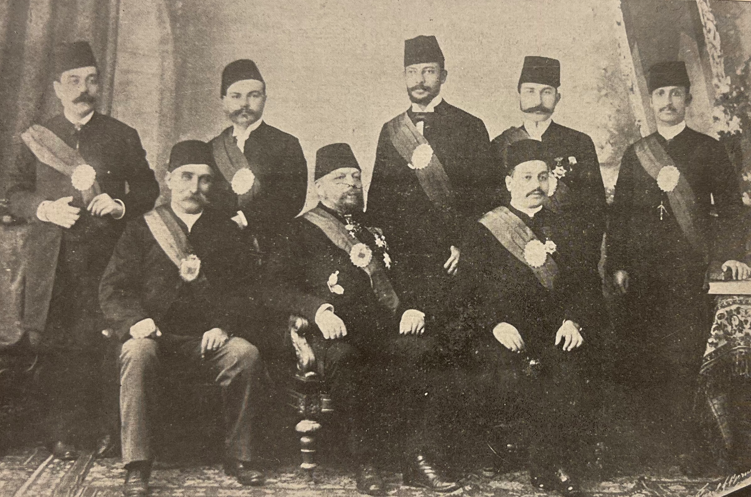Gert Huskens
Belgian Diplomacy and the Creation of Mixed Courts in Egypt
Gert Huskens

The prosecutor's office of Alexandria in 1891. Belgian attorney general Guillaume De Brouwer can be seen seated on the front row, second from the left. [1]
“The cornerstone of the Reform is the European judge – the judge from abroad,
who brings with him the traditions which are the rightful birthright of a magistracy." [2]
At the end of the 1860s the wind of change that propelled Egypt’s modernization reached the country’s judicial system. An amalgam of evolutions had paved the way for a reinterpretation of the Egyptian judicial system and a new system was convened upon between the Egyptian government and the Western powers that become increasingly present in the country. This new system were the Mixed Courts. A lot of the success of the Mixed Courts depended – as the above-mentioned quote by prime minister Nubar Pasha shows – on the judges that would sit on the bench. Notwithstanding their importance to the new institution, the way they were selected and introduced to Egypt has however not been given the attention it deserves.
The idea had not received a warm welcome by the Belgian diplomatic corps in Egypt. Prejudices, distrust and hesitation fueled the stance of Belgian consuls-general Étienne Zizinia and most importantly Charles Hector de Noidans Calf. On the other hand however, the Belgian government did not want to merely watch one of the country’s backbones being reformed by the major powers without having at the least being allowed to assist the negotiations. Via these meetings, several of the delegates attending it trickled into the new judiciary, including future governor-general of the Congo Free State Camille Janssen. A second route towards Egypt was opened by the Belgian government itself, who was officially in charge of providing their Egyptian counterparts with magistrates, by launching a public call. Even though most of these applications ended up in the paper bin, three perfect candidates were found. Next to Camille Janssen, Belgium sent Adolphe Devos, King’s prosecutor in Bruges and Guillaume De Brouwer, substitute of the King’s prosecutor in Brussels. Especially de Brouwer, who would climb the ranks of the Mixed Courts and was attorney general in Alexandria from 1889 until his death in 1892 left an impression Belgium could profit already quite early from the opportunities this new transnational organization provided. As then prime minister of Belgium Walthère Frère-Orban realized, the country really punched above its international weight in the early days of the Mixed Courts. With no less than three judges, who were appointed at the Mixed Court’s most prestigious positions, Belgium translated its intellectual importance in the emerging field of international law into a tangible result. As history would later prove, this early involvement in the creation of the Mixed Courts would later result in a sustainable and lasting impact on Egypt’s legal history. In the interwar period, Belgian judges were among the country’s most prominent legal experts, and in 1923, Firmin Van den Bosch, Belgian attorney general at the Court of Appeal of Alexandria, even helped to draft the constitution of Egypt. As Huskens demonstrated, the seeds of this lasting impact on the judicial fundaments of a country as small as Belgium on Egypt, were sawn more than a half century earlier.
Notes
[1] Les juridictions mixtes d'Égypte 1876-1926 : livre d'or édité sous le patronage du Conseil de l'ordre des avocats à l'occasion du cinquantenaire des tribunaux de la réforme, par le Journal des tribunaux mixtes, (Alexandria: Journal des tribunaux mixtes, 1926).
[2] Jasper Yeates Brinton, The Mixed Courts of Egypt (New Haven and London. Yale Univ. Press., 1968), 72–73.
Further reading
Cannon, B., Politics of Law and the Courts in Nineteenth-Century Egypt (Salt Lake City: University of Utah Press, 1988).
J. Brown, N. J., ‘The Precarious Life and Slow Death of the Mixed Courts of Egypt’, International Journal of Middle East Studies 25, no. 1 (1993): 33-52.
Todd, D., ‘Beneath Sovereignty: Extraterritoriality and Imperial Internationalism in Nineteenth-Century Egypt’, Law and History Review 36, no. 1 (February 2018): 105-137
Hoyle, M. S. W., University of London, and School of Oriental and African Studies, The Mixed Courts of Egypt 1875-1949: A Study of Their Development and Operation, and Their Influence on Post-War Egyptian Law, 1983.
 Gert Huskens is a doctoral candidate at Université libre de Bruxelles (ULB) and Ghent University in the FWO and FNRS-funded EOS (Excellence of Science)-project No. 30885993 'Pyramids and Progress. Belgian expansionism and the making of Egyptology, 1830-1952'. His PhD-project is titled ‘Brokering the Orient. An entangled history of Belgian diplomacy in Egypt, 1830-1914’.
Gert Huskens is a doctoral candidate at Université libre de Bruxelles (ULB) and Ghent University in the FWO and FNRS-funded EOS (Excellence of Science)-project No. 30885993 'Pyramids and Progress. Belgian expansionism and the making of Egyptology, 1830-1952'. His PhD-project is titled ‘Brokering the Orient. An entangled history of Belgian diplomacy in Egypt, 1830-1914’.
Back to Meridian 3

